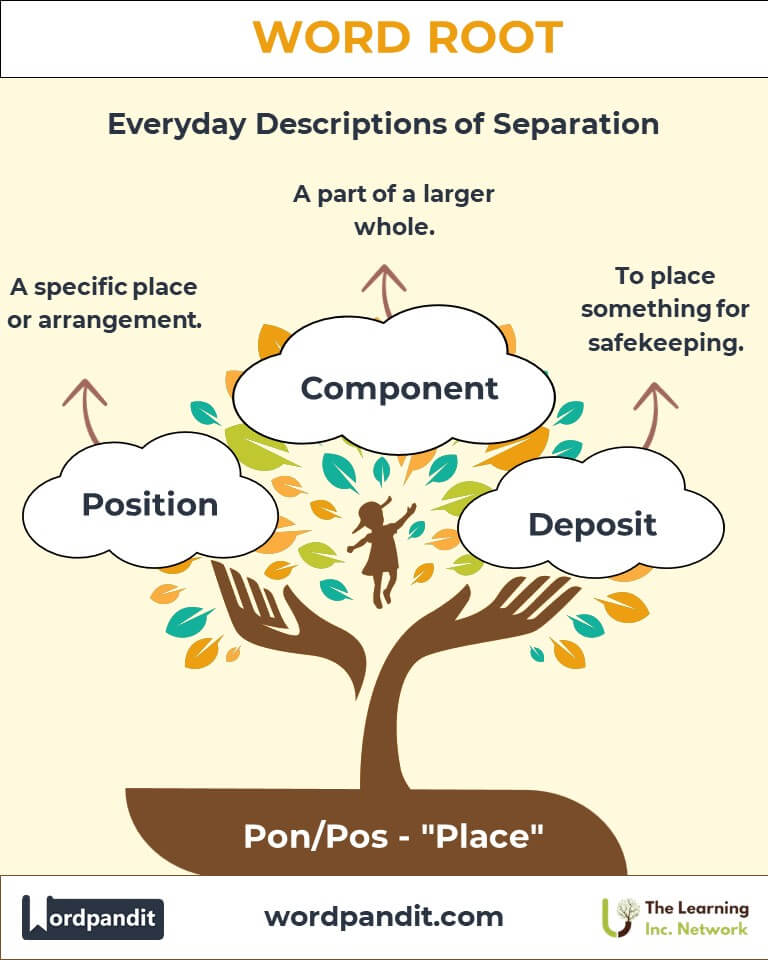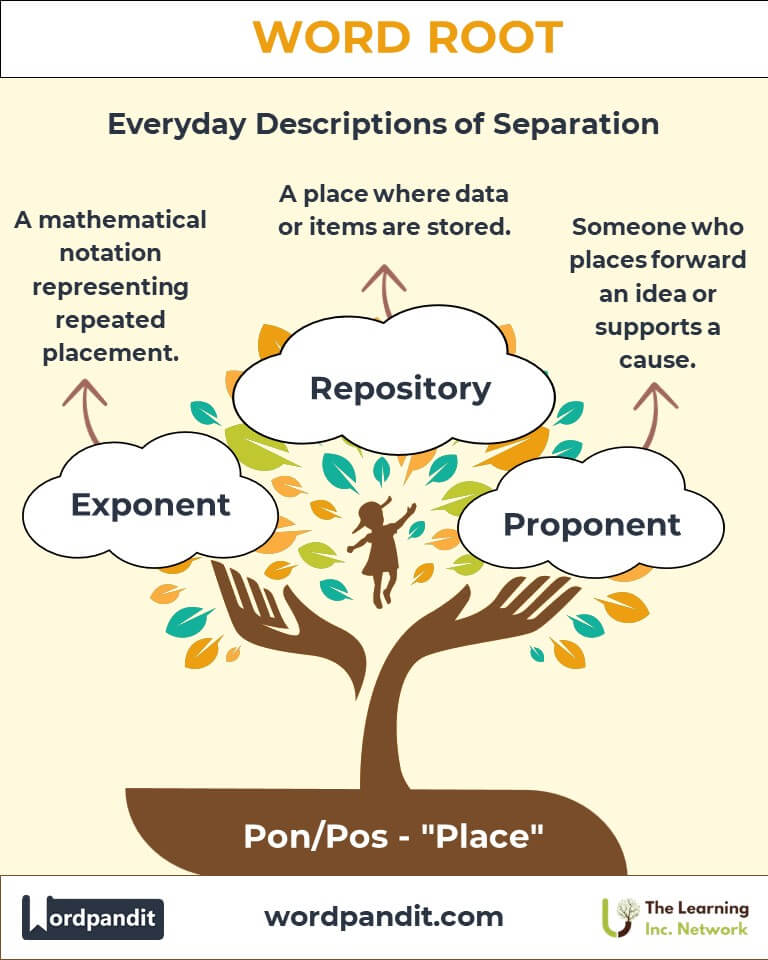Pon and Pos: The Foundation of Placement and Order
Discover the power of the word roots "pon" and "pos," both meaning "place," derived from Latin. These roots have given rise to numerous terms that shape the way we describe arrangement, placement, and position in everyday life and specialized disciplines.

Table of Contents
- Introduction: The Power of Placement
- Etymology and Historical Journey
- Mnemonic: Unlocking the Power of Pon and Pos
- Common Pon and Pos-Related Terms
- Pon and Pos Through Time
- Pon and Pos in Specialized Fields
- Illustrative Story: Pon and Pos in Action
- Cultural Significance of Pon and Pos
- The Pon and Pos Family Tree
- FAQs about the Pon and Pos Roots
- Test Your Knowledge: Pon and Pos Mastery Quiz
- Conclusion: The Enduring Relevance of Pon and Pos
1. Introduction: The Power of Placement
Have you ever "positioned" yourself in a room or considered the "components" of a structure? These everyday terms owe their existence to the Latin roots pon and pos, which mean "to place." These versatile roots describe the act of setting, arranging, or organizing, forming the basis of words that influence disciplines from architecture to philosophy.

2. Etymology and Historical Journey
The roots pon (from ponere) and pos (from positus) both originate from Latin, meaning "to place or put." Over time, they evolved into various forms, entering English through Old French during the Middle Ages. Words like "position" and "component" reflect their deep linguistic legacy, embodying concepts of placement and structure that have shaped language across centuries.
3. Mnemonic: Unlocking the Power of Pon and Pos
Visualize a shelf full of neatly placed books, each representing a word derived from pon and pos. Every term reflects a thoughtful act of placement or arrangement.
Mnemonic Device: "Pon and Pos make it possible to place with purpose!"
4. Common Pon and Pos-Related Terms
- Position (puh-ZIH-shun): A specific place or arrangement.
Example: "Her position in the company reflects years of dedication." - Component (kuhm-POH-nent): A part of a larger whole.
Example: "The components of the engine were carefully examined." - Deposit (dee-POZ-it): To place something for safekeeping.
Example: "She deposited the check into her bank account." - Compose (kuhm-POHZ): To create or arrange parts into a whole.
Example: "The composer skillfully composed a new symphony." - Impose (im-POHZ): To place a burden or obligation on someone.
Example: "The government imposed new taxes on imports." - Proponent (proh-POH-nent): Someone who places forward an idea or supports a cause.
Example: "She is a proponent of renewable energy."
5. Pon and Pos Through Time
Deposit: Initially referred to physical placement, such as leaving money in safekeeping, but now includes digital and symbolic contexts.
Position: Evolved from literal placement to encompass abstract roles, like social standing or job titles.
6. Pon and Pos in Specialized Fields
- Business: Propose: To suggest a plan or idea for consideration.
- Mathematics: Exponent: A notation representing repeated placement in multiplication.
- Medicine: Opposition: Movement where one body part is placed against another.
- Technology: Repository: A place where data or items are stored.
Illustrative Story: Pon and Pos in Action
In a bustling city, an urban planner worked to position bike racks near metro stations, ensuring easy access. Meanwhile, a scientist analyzed the components of a new polymer, carefully composing data reports. Across town, an artist arranged sculptures to propose harmony between modern and traditional styles. These individuals, though in different fields, demonstrated the enduring significance of pon and pos in shaping the world.
Cultural Significance of Pon and Pos
The act of placement is central to human expression. From ancient rituals of imposition in religious ceremonies to modern debates on position in society, these roots capture the essence of organization and hierarchy. Philosophers like Descartes used "position" to describe existence, proving its versatility in both thought and action.

The Pon and Pos Family Tree
- Ponere (Latin): To place.
- Example: Exponent, Opponent.
- Positum (Latin): To place in a set position.
- Example: Positive, Position.
- Pose (French): To set or arrange.
- Example: Suppose, Repose.

FAQs About the "Pon/Pos" Word Roots
Q: What do "Pon" and "Pos" mean?
A: "Pon" and "Pos" are derived from the Latin roots "ponere" and "positus," both meaning "to place" or "to put." They form the foundation of numerous English words related to placement, arrangement, and positioning in physical or abstract contexts.
Q: How are "position" and "composition" related?
A: Both words share the root "Pos." "Position" refers to the act or state of placing something, while "composition" involves arranging parts to create a whole, such as in music, writing, or art. They highlight static and creative aspects of placement, respectively.
Q: What does "impose" mean?
A: "Impose" means to place a burden or obligation on someone, often without consent. The root "im-" (into) combined with "ponere" (to place) conveys the idea of forcing something onto someone.
Q: What is a repository?
A: A repository is a space designated for storing items, data, or resources. It can be physical, like a library, or digital, like an online file repository, emphasizing its root meaning of "a place to put things."
Q: How does "proponent" reflect the root "Pon"?
A: A proponent is someone who supports or advocates for an idea. The root "Pon" signifies "to place," so a proponent "places forward" an idea or cause for others to consider or support.
Test Your Knowledge: "Pon/Pos" Word Roots Quiz
1. What does "compose" mean?
2. Which term involves placing something for safekeeping?
3. What does "position" mean?
4. Which term describes a space for storing items or data?
5. What is the root meaning of "impose"?
12. Conclusion: The Enduring Relevance of Pon and Pos
The roots pon and pos continue to enrich our language, offering clarity and structure to concepts of placement and organization. From composing art to depositing ideas, their versatility underscores their linguistic importance. As we "position" ourselves in a world of ideas, let pon and pos remind us of the power of purposeful placement.














